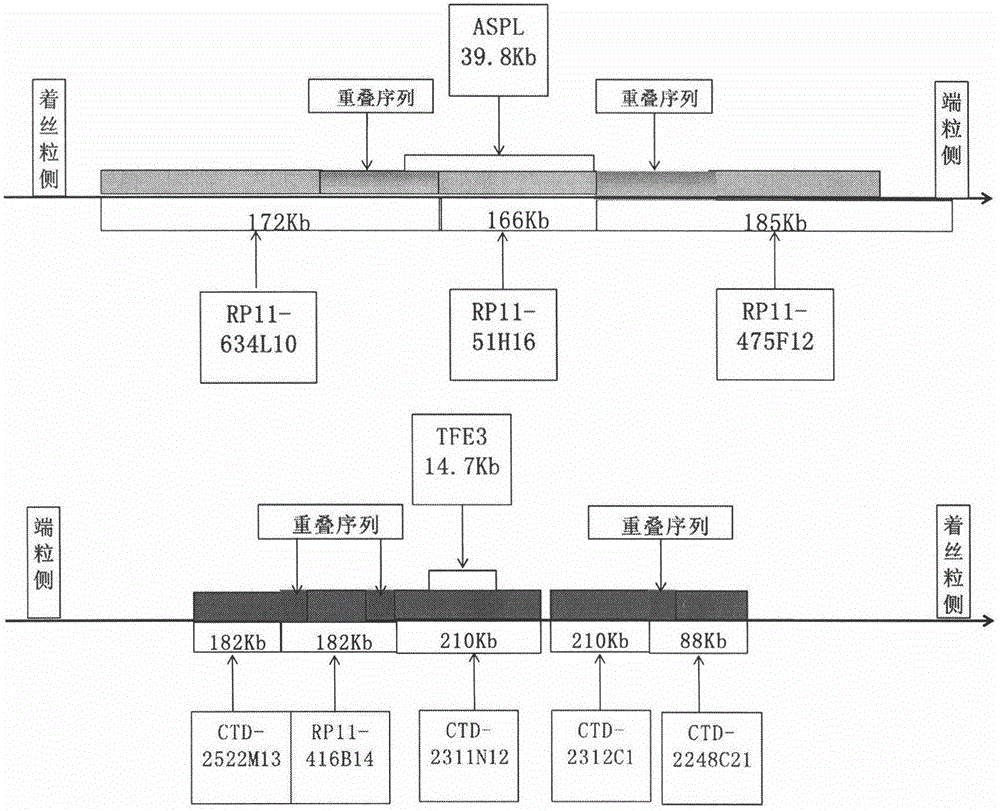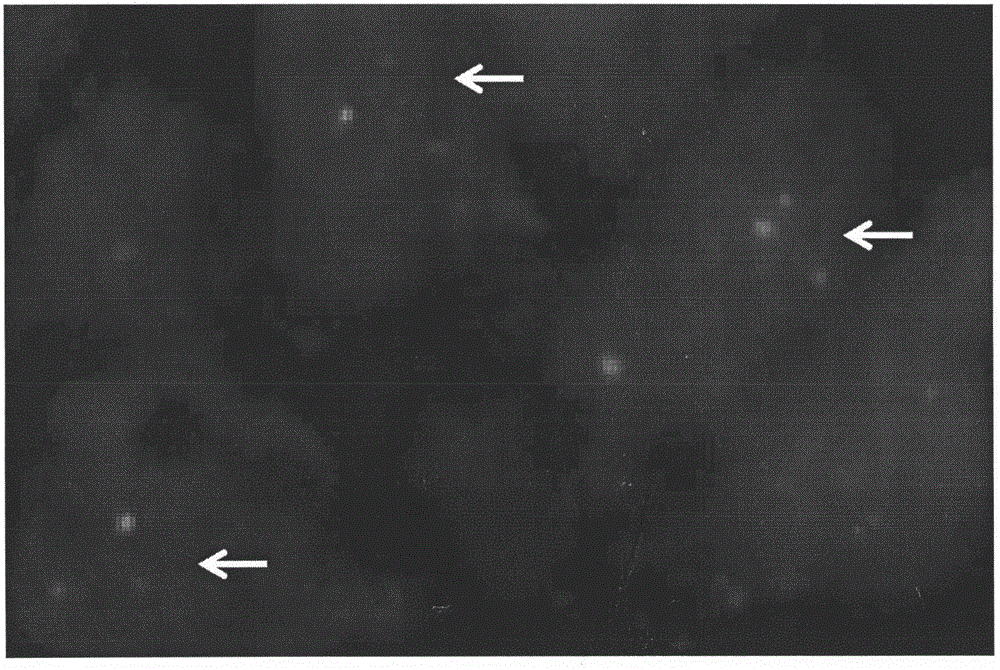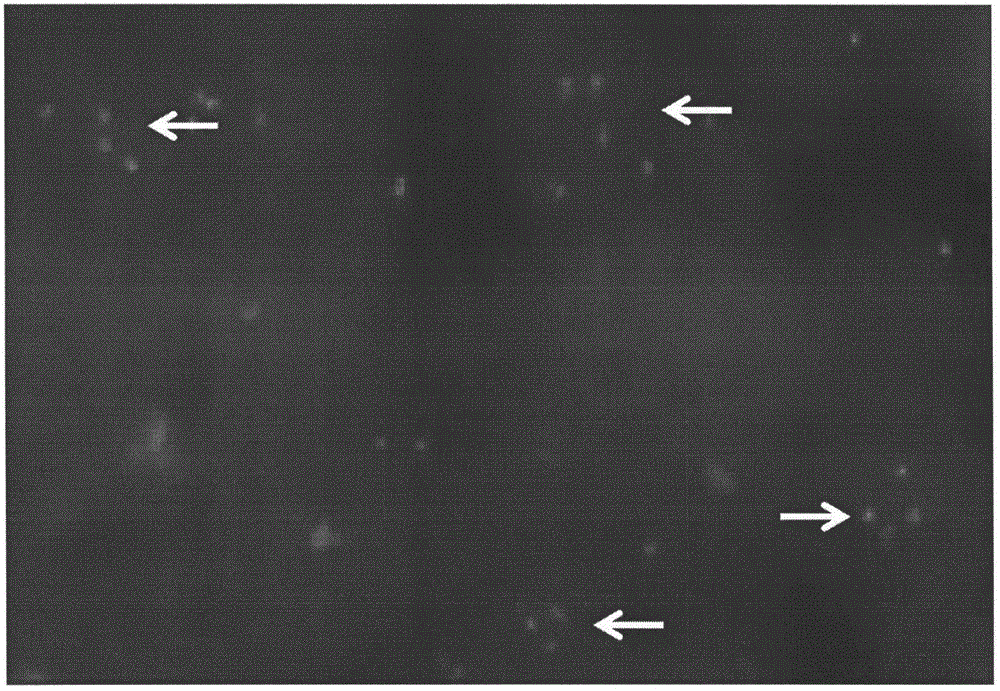Application of gene probes and kits for alveolar soft tissue sarcoma
A soft tissue sarcoma and gene probe technology, which is applied in the application field of fluorescence in situ hybridization probes, can solve the problems of time-consuming, unsuitable, complicated technology and difficult diagnosis, and achieves accurate, reliable and simple diagnosis, strong fluorescence signal, and high accuracy. high effect
- Summary
- Abstract
- Description
- Claims
- Application Information
AI Technical Summary
Problems solved by technology
Method used
Image
Examples
Embodiment 1
[0039] Step 1: Preparation of Gene Probes:
[0040] Find the bacterial artificial chromosome (BAC clone) corresponding to the X chromosome TFE3 gene and ASPL gene through http: / / genome.ucsc.edu / , select the corresponding BAC clone fragments respectively, and control the complete coverage of the BAC clone fragments selected on the same side relative to the gene , and the fragments on the same side have a certain sequence overlap with each other. According to the above requirements, the BAC clone fragments on the ASPL gene were selected as RP11-634L10 (chr17: 79796813-79969288, the fragment length is about 172Kb), RP11-51H16 (chr17: 79931578-80097452, the fragment length is about 166Kb) and RP11-475F12 ( chr17: 80032268-80216871, the fragment length is about 185Kb); the BAC clone fragment on the TFE3 gene is CTD-2311N12 (chrX: 48713289-48923401, the fragment length is about 210Kb), CTD-2522M13 (chrX: 48420425-48602847, The fragment length is about 182Kb), RP11-416B14 (chrX: 485...
Embodiment 2
[0052] Example 2: Diagnostic kit for alveolar soft tissue sarcoma
[0053] Gene probe kit for alveolar soft tissue sarcoma, the kit is composed of probe hybridization solution and 4', 6-diamidino-2-phenylindole counterstaining agent, characterized in that:
[0054] (1) The combination of RP11-634L10, RP11-51H16, and RP11-475F12 located on the ASPL gene on chromosome 17, marked with a red fluorescent signal; Combination of CTD-2312C1 and CTD-2248C21, labeled as green fluorescent signal;
[0055] (2) The probe hybridization solution is prepared by mixing the probe with Human Cot-1 DNA, hybridization buffer, and purified water in proportion, and it needs to be stored at -20°C in the dark;
[0056] (3) 4′,6-diamidino-2-phenylindole counterstain is mainly used for nuclear staining.
[0057] (4) The combination of RP11-634L10, RP11-51H16 and RP11-475F12 located on the ASPL gene of chromosome 17 described in the Gene Probe Kit for Acinar Soft Tissue Sarcoma, the three clone fragmen...
PUM
 Login to View More
Login to View More Abstract
Description
Claims
Application Information
 Login to View More
Login to View More - R&D
- Intellectual Property
- Life Sciences
- Materials
- Tech Scout
- Unparalleled Data Quality
- Higher Quality Content
- 60% Fewer Hallucinations
Browse by: Latest US Patents, China's latest patents, Technical Efficacy Thesaurus, Application Domain, Technology Topic, Popular Technical Reports.
© 2025 PatSnap. All rights reserved.Legal|Privacy policy|Modern Slavery Act Transparency Statement|Sitemap|About US| Contact US: help@patsnap.com



